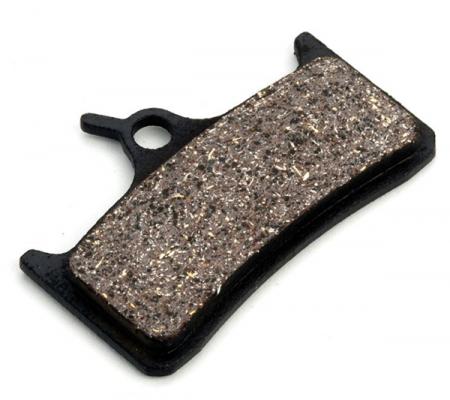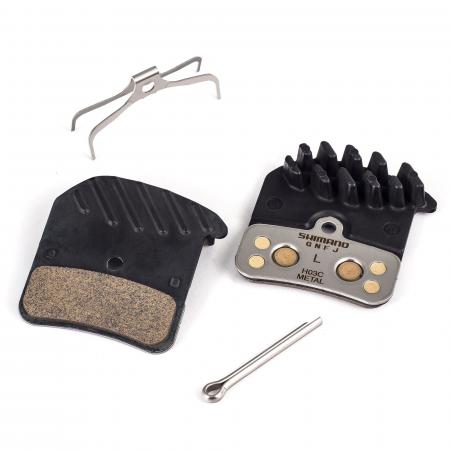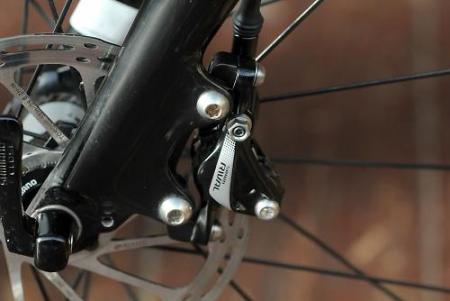- News
- Reviews
- Bikes
- Components
- Bar tape & grips
- Bottom brackets
- Brake & gear cables
- Brake & STI levers
- Brake pads & spares
- Brakes
- Cassettes & freewheels
- Chains
- Chainsets & chainrings
- Derailleurs - front
- Derailleurs - rear
- Forks
- Gear levers & shifters
- Groupsets
- Handlebars & extensions
- Headsets
- Hubs
- Inner tubes
- Pedals
- Quick releases & skewers
- Saddles
- Seatposts
- Stems
- Wheels
- Tyres
- Tubeless valves
- Accessories
- Accessories - misc
- Computer mounts
- Bags
- Bar ends
- Bike bags & cases
- Bottle cages
- Bottles
- Cameras
- Car racks
- Child seats
- Computers
- Glasses
- GPS units
- Helmets
- Lights - front
- Lights - rear
- Lights - sets
- Locks
- Mirrors
- Mudguards
- Racks
- Pumps & CO2 inflators
- Puncture kits
- Reflectives
- Smart watches
- Stands and racks
- Trailers
- Clothing
- Health, fitness and nutrition
- Tools and workshop
- Miscellaneous
- Buyers Guides
- Features
- Forum
- Recommends
- Podcast
 Replacing disc brake pads Sept 2018
Replacing disc brake pads Sept 2018All you need to know about replacing disc brake pads
The brakes on your bicycle go unnoticed most of the time. Until they stop working so well, that is. One of the common causes of poor brake performance is worn out brake pads. Here’s everything you need to know about replacing and upgrading your disc brake pads.
How long will my brake pads last?
How long you can expect brake pads to last is like asking how long a piece of string is. Different compounds impact the durability of a brake pad. Then there is the type of riding, the terrain, the weather conditions, the rider weight, these are factors that influence how long the brake pads last. Generally, you can expect disc brake pads to last longer than rim brake blocks, part of the reason they have become popular in the UK.
- Everything you need to know about disc brakes
When to replace brake pads
If you ride frequently, it’s a sensible idea to visually inspect your brakes on a regular basis. While brake pads can last a very long time, the last thing you want is to get caught out miles away from home with ineffective brake pads because you’ve let them wear down dangerously. Brake pads will wear more quickly in the winter so it’s critical to pay them close attention at this time of year.
If your brakes don’t feel as good as they did when the bike was new, it might be a sign you need some new brakes. With mechanical (cable operated) disc brakes, you can start to tell when your brake pads are wearing down as the brake lever will pull closer to the handlebar. To remedy this, you can take out the slack in the system by using the barrel adjuster on the lever or caliper to adjust the cable tension. Hydraulic systems automatically adjust the pad clearance.
- 2016's hottest disc-equipped road bikes
It’s a little tricky to do a quick visual inspection of disc brake pads. While you can peer closely at the caliper and see how much pad material is remaining on the metal backing plate, sometimes it’s easier to remove the wheel and inspect the brake pads without the disc rotor inserted between the pads.
There should be a reasonable amount of pad material on the metal back plate, a couple of millimetres at least, any less than that and it's a good time to replace them. If all you can see is the backing plate, you need some new pads!
If you do wear down your brake pads to the metal backing plate, you’ll likely know since they’ll make an awful sound and the performance will be poor. This is the reason for the frequent inspections, to replace the pads before they get dangerously low.
What brake pad choices are there?
Disc brake pads typically come in three flavours; sintered, organic and semi-metallic.
Sintered pads
Sintered pads are made from hardened metallic ingredients and provide a long lifespan and good performance in the wet. They do take a bit longer to bed-in however, and they can sometimes be a bit noisy, but they cope with high temperatures well and are a good choice if doing some long descents, such as riding in the mountains.
Organic pads
Organic (or resin or non-metallic pads) pads are made from organic materials and bound together using resin. The material is soft so the bed-in period is much shorter, and that means they have more initial bite and they’re quieter. They don’t last as long as sintered pads, and they’re not great in wet conditions, and can glaze at higher temperatures.
Semi-metallic pads
The third option is semi-metallic. These combine metal and organic materials using resins to hold everything together with a steel or aluminium backing plate. They strive to provide performance that is somewhere between sintered and organic, but it depends on how much metal the manufacturer adds to the compound.
If you were to choose between these different pads, you would put sintered pads on for the winter, and organic for the summer, but many cyclists use sintered year-round quite happily.
Other options
Some manufacturers offer disc brake pads that attempt to reduce the heat buildup in a disc caliper. Koolstop produces a disc pad with a ceramic barrier between the organic material and the steel backing plate, to limit the heat that is transferred to the brake caliper.
Shimano produces Ice-Tech disc pads with feature cooling fins that operate like a heat sink, drawing heat away from the pads.
Often the best route is to replace like-for-like. Each manufacturer will provide recommended pads, and that's typically the sensible choice. Look at any online retailer and you'll see a huge choice of pads at different price points, each offering different benefits, so it can be worth shopping around if you want to try something different.
Not all brake pads are the same though, they come in a bewildering range of shapes. You need to ensure you buy new brake pads that are compatible with your brakes.
Replacing disc brake pads
Fitting new disc brake pads can be a little tricky the first time you do it, but once you know how, it’s a doddle. You can sometimes replace the pads without removing the wheel, but it’s easier if you first remove the wheel. Use a workstand if you have one, otherwise carefully pop the bike against the wall on some cardboard or carpet to protect the bike/kitchen floor.
Most disc brakes have a retaining pin that is threaded through the top of the brake pads, often with a retaining circlip at one end. First carefully remove the clip and pin and put them somewhere safe. Now, extract the worn out brake pads and dispose of.
Next, and this is the trickiest part of the job, the pistons need to be pushed back into the caliper body. Most disc brakes, certainly all hydraulic systems, are self-adjusting. This involves the pistons automatically pushing out of the caliper body to keep the correct pad clearance as they wear down. Mechanical systems, however, work similarly to a caliper rim brake and the cable tension needs to be adjusted manually.
With the brake pads out, take a suitably sized spanner or flat head screwdriver, and very carefully push the pistons back into the caliper. It shouldn’t require too much force.
With the pistons back in the caliper, you can now fit the new brake pads, which is the reverse process of removing them. The new pads should slide in easily. Reinsert the retaining pin and clip, put the wheel back in, and cycle the brake lever a few times.
It can take a little while for disc brake pads to bed in, riding up and down the road and applying the brakes with some force is often enough to get them working well.
David worked on the road.cc tech team from 2012-2020. Previously he was editor of Bikemagic.com and before that staff writer at RCUK. He's a seasoned cyclist of all disciplines, from road to mountain biking, touring to cyclo-cross, he only wishes he had time to ride them all. He's mildly competitive, though he'll never admit it, and is a frequent road racer but is too lazy to do really well. He currently resides in the Cotswolds, and you can now find him over on his own YouTube channel David Arthur - Just Ride Bikes.
Latest Comments
- Newhey cyclist 1 hour 5 min ago
I agree with you
- wtjs 1 hour 14 min ago
Over 10 years ago my daughter bought a Carrera alloy road bike when she went to Uni. It served her very well. Several years later, while renovating...
- chrisonabike 1 hour 24 min ago
I haven't cycled in Livingston (sorry) for a couple of years now, but I remembered it as a place with an extensive network of footpaths you could...
- Rendel Harris 1 hour 58 min ago
I would love to see him do it but I have my doubts; the reason he could ride away from MVdP et al yesterday was because he had softened them up...
- Rendel Harris 2 hours 4 min ago
Thanks Steve, that's useful to know, I shall try it next week with Roubaix and hope that they don't switch to advertisements just as Pogacar puts...
- CmdrBiggles 3 hours 6 min ago
Nice they are out of the box (28-622) and easy to fit, but my first puncture, in the centreline of the tread, occurred at 133km, and it was none of...
- kcr 8 hours 29 min ago
I'd say it is an extremely rare condition for most cyclists or runners.
- ErnieC 11 hours 14 min ago
or Team Bahrain ... selective outrage.
- newbankgyratory 12 hours 16 min ago
This website offers suitable data: https://www.automobiledimension.com/large-suv-4x4-cars.php
- newbankgyratory 12 hours 49 min ago
Perhaps park the goods in a US Customs Bonded warehouse and then import them out of there when the tariff nonsense settles down?...




Add new comment
49 comments
"I notice that in the arguments for/against disc brakes, the issue of maintenance didn't seem to get mentioned much. Personally I find a set of v-brakes a lot easier to set up than hydraulic discs - and don't store your bike upside down for any length of time! "
having gone sort of full circle from road to mtb to drop bar hybrid/cx/adventure changing pads is easy enough - a big problem that doesn't get mentioned is not wearing out rims!
I notice that in the arguments for/against disc brakes, the issue of maintenance didn't seem to get mentioned much. Personally I find a set of v-brakes a lot easier to set up than hydraulic discs - and don't store your bike upside down for any length of time!
When bike sites review disc brakes I wish they would review how easy or hard it is to change the pads for non mechanics. Eg. my shimano ones are drop in easy whilst Hope and SRAM are finger fiddley nightmares!
I've owned various shimano hydro brake sets, Previous brakes were SRAM apex and new bike has SRAM Rival. I found the SRAMs easiest to replace.. Neither are particularly difficult though.
Maybe you could add tips about what to do when it goes wrong? e.g. when you have pushed your pistons all the way in but still there is not enough clearence between the rotor and the pads.
If you're commuting or ride early, do consider how anit-social noisy brake pads can be. I use organic pads for the simple reason they're much less likely to squeal. They do wear down a bit quicker but also cost less and in typical use last ages anyway.
sounds good but what are organic pads like in the wet? Tempted to change but I don't want to go back to that helpless feeling you have with rim brakes in the wet.
I replaced the BB7 pads on my Croix de Fer with organic pads, boy do I regret it, haven't bedded in at all & have about as much grip as a bar of soap, have to ride with them just fouling the discs to have any hope of stopping in both the wet & the dry. Personally I would not recommend organic pads.
are you very sure you havent contaminated the pads? I only use organic on my XTRs and the only time braking is iffy is when oil gets on the rotors and or pads. Which as an aside, how much winter crud ends up on rotors and pads basically trashing them??
When I was commuting by bike I was glad of the squeal because it announced my presence to otherwise oblivious road users. If you ride early then you hardly need to brake since there's no one else around.
Ah, I love the old "refitting is the reverse of removal" schtick.
Not a single mention of "Curse when the circlip bounces off into the distance", no "try again when you realise you fitted them the wrong way up", and no "ask your wife to drive you to hospital with a scratched eyeball"?
"reasonable amount of pad material on the metal back plate, a couple of millimetres at least"
That seems very thick. They are only about 2mm when new, and the manual for mine says to replace then when down to 0.7mm.
and i seem to remember that Magura are, or were very specific organic pads only on their MTB brakes, to the point they would not honour a warranty claim where sintered pads were used.
From memory, you're not allowed to use anything other than Magura pads. You have to use Magura blood and any modification other than OEM voids warranty.
Rotors and pads are disposable items. Only use best items for best performance and sod the wear rate
...and the environment. When future generations uncover piles of disposable items they'll no doubt look back and think "Yep, they had the right idea".
I think it should be added that there are discs targeted for resin pads only which will wear down very fast if sintered pads are used.
I assume at least one of these should be "organic"?
Just changed the pads on my disc bike for the first time. Nice guide, just wish I'd had it last week
Yes. Stupid fingers. Great, glad you liked it
Pages